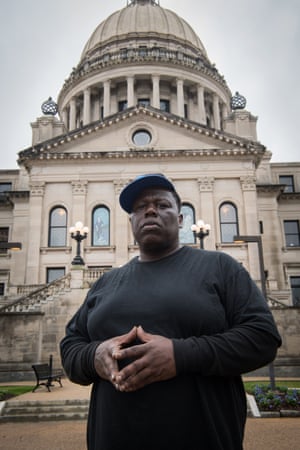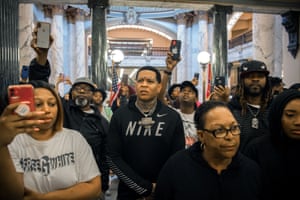Inside the US prison where inmates ‘begged for their lives’ amid days of violence
In a system marked by racism and neglect, five inmates died this month. Prisoners and families demand urgent reform

People were begging for their lives as they were stabbed, said Kelly Mallett, as his gaze drifted. There were fires being set. Trash everywhere. Rats. Roaches. It was just total chaos.
The 44-year-old is a former inmate at Mississippis crumbling state penitentiary at Parchman, part of a sprawling, century-old prison farm complex in the north of the state. He had only been free for two days and was the first eyewitness to speak freely in public about the days of bloody rioting inside Parchman over the new year, a facility that remains shrouded in the legacy of Jim Crow, marked by decaying conditions and its culture of brutality.
In a single week, five inmates in the Mississippi correctional system were killed, three in Parchman, during violence state officials tied to a bitter gang rivalry that dominates prisons in the state. But the bloodshed has also drawn attention to what lawmakers say are routine constitutional violations, as well as the chronic underfunding of a system that incarcerates people at a rate almost twice the American average.

For 48 hours it was just violence, said Mallett, who served an eight-year sentence for a non-violent drug crime. Nothing but violence, before any help.
Still wearing an electronic ankle bracelet, the former inmate said highway patrol officers eventually stormed his unit and retook it, an event he believed occurred on 3 January. Mallett said he was locked in his cell throughout the rioting and was not involved in the violence, but also openly declared his gang affiliation.
He claimed to have been escorted by armed state officers when he was released on 8 January, due to ongoing safety concerns.
It is pure hell there, he said. Inside you have no rights.
The Mississippi department of corrections (MDC) declined to respond to multiple requests for comment and has not provided a public total for the number injured during the unrest. A prison source, speaking on condition of anonymity in order to protect themselves from reprisals, claimed that as of Friday there were still many injured inmates at Parchman who had not received treatment.
On Friday, MDC lifted a statewide prison lockdown but excluded Parchman, where more than 3,000 inmates are held. A heavy police presence remained outside the sprawling complex, which was built in 1901 and modelled after a slave plantation to extract free labor from inmates. Mississippi continues to incarcerate African Americans at a disproportionate rate.
In interviews with six people who had family or partners inside the facility, three said they had not heard from them since the violence began. Those who had contacted their loved ones had done so via contraband cellphones, which are widely used in Parchman. None had any formal confirmation from MDOC, despite making calls.
Its just extremely rough not knowing whats going on, said 38-year-old Romania Harry, whose partner Richard OKelley is in the eighth year of a 10-year sentence for aggravated assault and burglary. We get no information and no sympathy from Corrections.
Harry said she was particularly concerned as her partner is in a wheelchair following back surgery. Her account was supported by photographic evidence. She claimed OKelley was not receiving medicine before the rioting started.

According to MDC records, OKelley is held in the notorious Unit 32. The building was shuttered in 2010 as part of a settlement with the American Civil Liberties Union (ACLU), after the group documented inhumane conditions including the use of permanent solitary confinement.
Following rioting earlier this month, it was reopened. It housed hundreds of men.
Paloma Wu, a senior staff attorney with the Southern Poverty Law Centre (SPLC), said a client she visited at Parchman on Thursday had been held in Unit 32 for about five days.
The client, who did not wish to be named, told his attorney there had been no running water for four days, meaning inmates had to defecate into empty toilets that soon overflowed. The client had not showered and had slept on a concrete floor. Food had been as little as a slice of bread.
The Guardian reviewed photographic evidence as well as video which supported this description of conditions.
We have been treating these people like animals for decades, Wu said. Worse than animals, in fact.
On Tuesday, Mississippis lone Democratic congressman, Bennie Thompson, joined with the SPLC and ACLU to write to the US justice department, requesting a federal investigation into all Mississippis correctional facilities, which include three state-run and three private prisons.
The letter alleged violation of constitutional rights under the eighth amendment, which safeguards against cruel and unusual punishment.
It is no exaggeration to say more lives will be lost absent immediate intervention, it said.

Thompson cited severe staff shortages: 670 staff positions across the three state prisons are unfilled, causing some prisoners to be held in lockdown throughout 2019. Although Mississippi has the third-highest rate of incarceration in the US, last month its budget committee recommended reducing spending on state facilities by up to 6.6%. Mississippi pays the lowest salaries for prison staff anywhere in the US.
The crisis is expected to dominate the next legislative session, which begins this month. The outgoing governor, Phil Bryant, has acknowledged the fiscal problems but blamed inmates for the January violence.
The inmates are the ones that take each others lives, he told reporters. The inmates are the ones that fashion weapons out of metal. So, I would say look to the inmates.
On Friday, protesters organized by the Mississippi Poor Peoples Campaign entered the state capitol in Jackson. They marched up two flights of stairs and stood outside Bryants office but were told by security officers he was not available to meet.
Among them was Eva Scott, a 47-year-old retail worker. In early December her nephew Antonio Taylor, 33, was found dead in his cell at Parchman. It was ruled a suicide by hanging but the family, who found out about the death through inmates, not authorities, distrusted the coroners ruling.
Nobody should live like [the inmates] do, Scott said. Thats a human being. Somebodys child. If you have to live in a place like that, you just have to fight for your life.
Read more: https://www.theguardian.com/us-news/2020/jan/13/mississippi-prison-violence-inmates-parchman
